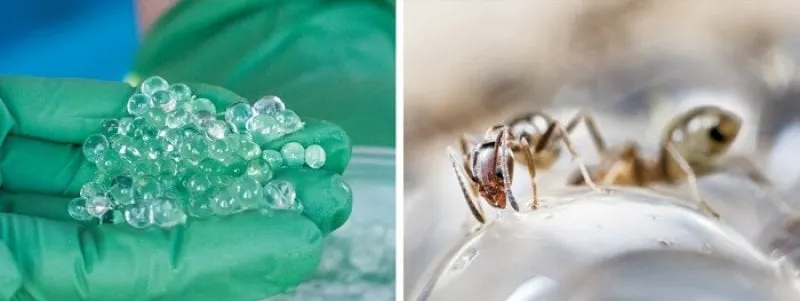Replacing pesticides: Expected chlorpyrifos ban spurs development of more sustainable insecticides
Replacing pesticides: Expected chlorpyrifos ban spurs development of more sustainable insecticides


A broad-spectrum insecticide that kills all arthropods in its path, chlorpyrifos was used for decades throughout the US …. But use has declined steadily since a 1996 law raised safety standards to protect children against possible neurodevelopmental effects.
…
A full US ban may be coming, depending on the outcome of a lawsuit and the upcoming presidential election. Sales of chlorpyrifos ceased in the European Union at the end of January 2020. Citing low demand, Corteva Agriscience, the largest manufacturer of chlorpyrifos, announced in early February that it will phase out production of the chemical this year.
Mark Hoddle, a biological-control specialist and principal investigator at the University of California, Riverside …. and colleagues are testing biodegradable hydrogel beads …. containing 25% sucrose and a small amount (0.0001%) of a water-soluble insecticide …. The ants feed the insecticide-laced sugar water to the queens and other workers, poisoning the colony. The advantage of the hydrogel beads is that they degrade into the soil after 2–3 days …. You just put out another batch a couple of weeks later, [Hoddle] says.
…
Growers may grumble at the forced change from a familiar broad-spectrum insecticide to new products that are more targeted, but in the long term it may be for the good. “Many of these newer chemistries are safer or easier to work with,” [Ohio State University entomologist Kelley] Tilmon says.
Read the original post

 | Videos | More... |

Video: Nuclear energy will destroy us? Global warming is an existential threat? Chemicals are massacring bees? Donate to the Green Industrial Complex!
 | Bees & Pollinators | More... |

GLP podcast: Science journalism is a mess. Here’s how to fix it

Mosquito massacre: Can we safely tackle malaria with a CRISPR gene drive?

Are we facing an ‘Insect Apocalypse’ caused by ‘intensive, industrial’ farming and agricultural chemicals? The media say yes; Science says ‘no’
 | Infographics | More... |

Infographic: Global regulatory and health research agencies on whether glyphosate causes cancer
 | GMO FAQs | More... |

Why is there controversy over GMO foods but not GMO drugs?

How are GMOs labeled around the world?

How does genetic engineering differ from conventional breeding?
 | GLP Profiles | More... |

Alex Jones: Right-wing conspiracy theorist stokes fear of GMOs, pesticides to sell ‘health supplements’




 Trust issues: What happens when therapists use ChatGPT?
Trust issues: What happens when therapists use ChatGPT? California, Washington, Oregon forge immunization alliance to safeguard vaccine access against federal undermining
California, Washington, Oregon forge immunization alliance to safeguard vaccine access against federal undermining Fighting deforestation with CO2: Biotechnology breakthrough creates sustainable palm oil alternative for cosmetics
Fighting deforestation with CO2: Biotechnology breakthrough creates sustainable palm oil alternative for cosmetics Viewpoint — Fact checking MAHA mythmakers: How wellness influencers and RFK, Jr. undermine American science and health
Viewpoint — Fact checking MAHA mythmakers: How wellness influencers and RFK, Jr. undermine American science and health 30-year-old tomato line shows genetic resistance to devastating virus
30-year-old tomato line shows genetic resistance to devastating virus The free-range chicken dilemma: Better for birds, but with substantial costs
The free-range chicken dilemma: Better for birds, but with substantial costs Viewpoint: Video — Big Solar is gobbling up productive agricultural land and hurting farmers yet providing little energy or sustainabilty gains
Viewpoint: Video — Big Solar is gobbling up productive agricultural land and hurting farmers yet providing little energy or sustainabilty gains ‘You have to treat the brain first’:Rethinking chronic pain with Sanjay Gupta
‘You have to treat the brain first’:Rethinking chronic pain with Sanjay Gupta
